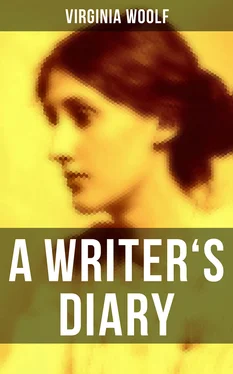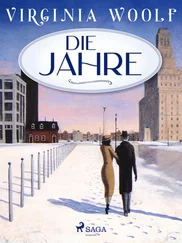Tuesday, October 21st.
This is Trafalgar day and yesterday is memorable for the appearance of Night and Day. My six copies reached me in the morning and five were despatched, so that I figure the beaks of five friends already embedded. Am I nervous? Oddly little; more excited and pleased than nervous. In the first place, there it is, out and done with; then I read a bit and liked it; then I have a kind of confidence, that the people whose judgment I value will probably think well of it, which is much reinforced by the knowledge that even if they don’t I shall pick up and start another story on my own. Of course, if Morgan and Lytton and the others should be enthusiastic, I should think the better of myself. The bore is meeting people who say the usual things. But on the whole I see what I’m aiming at; what I feel is that this time I’ve had a fair chance and done my best; so that I can be philosophic and lay the blame on God.
Thursday, October 23rd.
The first fruits of Night and Day must be entered. ‘No doubt a work of the highest genius’, Clive Bell. Well, he might not have liked it: he was critical of The Voyage Out. I own I’m pleased: yet not convinced that it is as he says. However, this is a token that I’m right to have no fears. The people whose judgment I respect won’t be so enthusiastic as he is, but they’ll come out decidedly on that side, I think.
Thursday, October 30th.
I have the excuse of rheumatism for not writing more; and my hand tired of writing, apart from rheumatism. Still, if I could treat myself professionally as a subject for analysis I could make an interesting story of the past few days, of my vicissitudes about N. and D. After Clive’s letter came Nessa’s—unstinted praise; on top of that Lytton’s: enthusiastic praise; a grand triumph; a classic; and so on; Violet’s sentence of eulogy followed; and then, yesterday morning, this line from Morgan ‘I like it less than The Voyage Out: Though he spoke also of great admiration and had read in haste and proposed re-reading, this rubbed out all the pleasure of the rest. Yes, but to continue. About 3 in the afternoon I felt happier and easier on account of his blame than on account of the others’ praise—as if one were in the human atmosphere again, after a blissful roll among elastic clouds and cushiony downs. Yet I suppose I value Morgan’s opinion as much as anybody’s. Then there’s a column in The Times this morning; high praise; and intelligent too; saying among other things that N. and D. , though it has less brilliance on the surface, has more depth than the other; with which I agree. I hope this week will see me through the reviews; I should like intelligent letters to follow; but I want to be writing little stories; I feel a load off my mind all the same.
Thursday, November 6th.
Sydney and Morgan dined with us last night. On the whole, I’m glad I sacrificed a concert. The doubt about Morgan and N. and D. is removed; I understand why he likes it less than V.O.; and, in understanding, see that it is not a criticism to discourage. Perhaps intelligent criticism never is. All the same, I shirk writing it out, because I write so much criticism. What he said amounted to this: N. and D. is a strictly formal and classical work; that being so one requires, or he requires, a far greater degree of lovability in the characters than in a book like V.O., which is vague and universal. None of the characters in N. and D. is lovable. He did not care how they sorted themselves out. Neither did he care for the characters in V.O., but there he felt no need to care for them. Otherwise, he admired practically everything; his blame does not consist in saying that N. and D. is less remarkable than t’other. O and beauties it has in plenty—in fact, I see no reason to be depressed on his account. Sydney said he had been completely upset by it and was of opinion that I had on this occasion ‘brought it off’. But what a bore I’m becoming! Yes, even old Virginia will skip a good deal of this; but at the moment it seems important. The Cambridge Magazine repeats what Morgan said about dislike of the characters; yet I am in the forefront of contemporary literature. I’m cynical about my figures, they say; but directly they go into detail, Morgan, who read the Review sitting over the gas fire, began to disagree. So all critics split off, and the wretched author who tries to keep control of them is torn asunder. For the first time this many years I walked along the river bank between ten and eleven. Yes, it’s like the shut up house I once compared it to; the room with its dust sheets on the chairs. The fishermen are not out so early; an empty path; but a large aeroplane on business. We talked very rarely, the proof being that we (I anyhow) did not mind silences. Morgan has the artist’s mind; he says the simple things that clever people don’t say; I find him the best of critics for that reason. Suddenly out comes the obvious thing that one has overlooked. He is in trouble with a novel of his own, fingering the keys but only producing discords so far.
Friday, December 5th.
Another of these skips, but I think the book draws its breath steadily if with deliberation. I reflect that I’ve not opened a Greek book since we came back; hardly read outside my review books, which proves that my time for writing has not been mine at all. I’m almost alarmed to find how intensely I’m specialized. My mind turned by anxiety, or other cause, from its scrutiny of blank paper, is like a lost child—wandering the house, sitting on the bottom step to cry. Night and Day flutters—about me still, and causes great loss of time. George Eliot would never read reviews, since talk of her books hampered her writing. I begin to see what she meant. I don’t take praise or blame excessively to heart, but they interrupt, cast one’s—eyes backwards, make one wish to explain or investigate. Last week I had a cutting paragraph to myself in Wayfarer ; this week Olive Heseltine applies balm. But I had rather write in my own way of Four Passionate Snails than be, as K.M. maintains, Jane Austen over again.
Table of Contents
Monday, January 26th.
The day after my birthday; in fact I’m 38, well, I’ve no doubt I’m a great deal happier than I was at 28; and happier today than I was yesterday having this afternoon arrived at some idea of a new form for a new novel. Suppose one thing should open out of another—as in An Unwritten Novel —only not for 10 pages but 200 or so—doesn’t that give the looseness and lightness I want; doesn’t that get closer and yet keep form and speed, and enclose everything, everything? My doubt is how far it will enclose the human heart—Am I sufficiently mistress of my dialogue to net it there? For I figure that the approach will be entirely different this time: no scaffolding; scarcely a brick to be seen; all crepuscular, but the heart, the passion, humour, everything as bright as fire in the mist. Then I’ll find room for so much—a gaiety—an inconsequence—a light spirited stepping at my sweet will. Whether I’m sufficiently mistress of things—that’s the doubt; but conceive(?) Mark on the Wall, K.G. and Unwritten Novel taking hands and dancing in unity. What the unity shall be I have yet to discover; the theme is a blank to me; but I see immense possibilities in the form I hit upon more or less by chance two weeks ago. I suppose the danger is the damned egotistical self; which ruins Joyce and Richardson to my mind: is one pliant and rich enough to provide a wall for the book from oneself without its becoming, as in Joyce and Richardson, narrowing and restricting? My hope is that I’ve learnt my business sufficiently now to provide all sorts of entertainments. Anyhow, I must still grope and experiment but this afternoon I had a gleam of light. Indeed, I think from the ease with which I’m developing the Unwritten Novel there must be a path for me there.
Читать дальше











